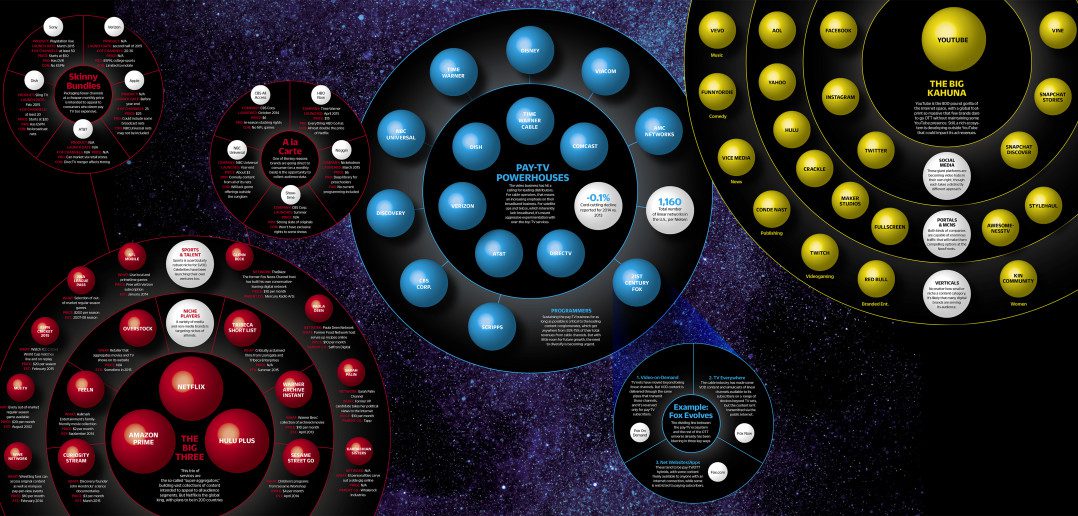“High-end” television — think Mad Men, Game of Thrones, Breaking Bad — has become the norm for numerous drama producers and broadcasters today. In the past two years, OTT platforms like Netflix and Amazon have joined the race, further stirring up competition in an already-tough market, dominated by broadcast and cable. So, what could push this ever-evolving content ecosystem to new frontiers in months and years to come?
New territories may rise on the international TV map: Germany, for instance, may even become the new European Eldorado. The Economist points out that Scandinavian hits The Killing, Wallander and The Bridge might never have been produced without the help of German public-service broadcasters. The next step? A potential new dawn for German drama:
If Germany embraces a more challenging form of drama, it has the potential to be a more prolific creator of high-end television drama than the smaller Scandinavian countries, which make only a handful of productions a year. Germany’s lack of a tradition of artistically challenging television drama (unlike the Danish industry, which grew up around a national film school and as a result has developed a distinct aesthetic style) could end up proving to be an advantage.
The real and deep changes to the content ecosystem are to be found elsewhere, though. ‘Traditional’ TV hasn’t said its last word in Europe, but the very notion of “high end” content is increasingly challenged. The new frontier isn’t between traditional players and OTT platforms anymore — it’s between these ‘traditional’ players and the new entrants in this galaxy of content.
The TV ecosystem has become extremely complex in the past 15 years, with incumbent entertainment and technology leaders investing in new platforms, as Variety notes: “there’s no small degree of confusion on the part of consumers and those in the industry alike as to how to make sense of all this chaos.” This is why the above map of the current ecosystem, via Variety, may help (top image; click to enlarge)!
Clearly though, online content creators have little do to with high-end TV producers as we know them. Exploring the strategies of BuzzFeed, Vice and Tastemade — three companies that generated considerable buzz at the NewFronts earlier this month — Fortune Magazine analyses the gap between “classic” and “online” content:
There’s nothing wrong with classic television content per se. It just doesn’t feel quite right in the context of the internet, where animated images of cats ricochet around Twitter, six-second Vine videos have a narrative arc, and your Aunt Sue douses herself with a bucket of ice water on Facebook.
There’s more: the forum/Q&A-based social network Reddit is joining the race as well, opening its own video division. “Original Reddit video will span both short- and long-form series and standalone pieces,” VideoInk reports: a bold move for a platform not used to showcasing its own content.
Then, there’s of course Snapchat: we’ve already explored the social platform’s content strategy and major creators on this blog, but the ephemeral messaging app just keeps growing. To the extent where, according to Fusion, “regulators have no idea how to handle it.”
So, who’s in control of the industry’s future, and the content it produces? Power is slowly shifting to telecom/tech giants and players eager to break new content barriers. Verizon, for instance, just bought AOL for $4.4 billion, to advance its “growth ambitions in mobile video and advertising,” The Wall Street Journal writes. The end of the independence of former internet giant AOL comes as a telling reminder that no company, however big, can afford to rest on its laurels…
When it comes to production companies, branded content is now a valuable option in these troubled times, according to Adweek. Marriott, for instance, received the MIPTV Brand of the Year Award earlier this year: the hotel chain “clearly understands the meaning of branded entertainment and is using it successfully to drive brand awareness and sales globally” via shows like Two Bellmen, Adweek further writes.
The boundaries of content keep being pushed forward, but one major problem remains for everyone: piracy. Long-form shows are still a major target for pirates, whereas short-form and viral content is less vulnerable. Should Hollywood studios’ recent landmark court victory against Popcorn Time – as reported by The Hollywood Reporter – be seen as the ‘old’ ecosystem’s last stand against its arch enemy, or too little too late? We’ll find out beyond the next frontier!
Discover more TV industry knowledge on our TV Biz News page, where the hottest business developments are curated by the MIP Markets team, via scoop.it… And see you at MIPCOM in October to witness the latest evolutions of the TV/content ecosystem in real time!




